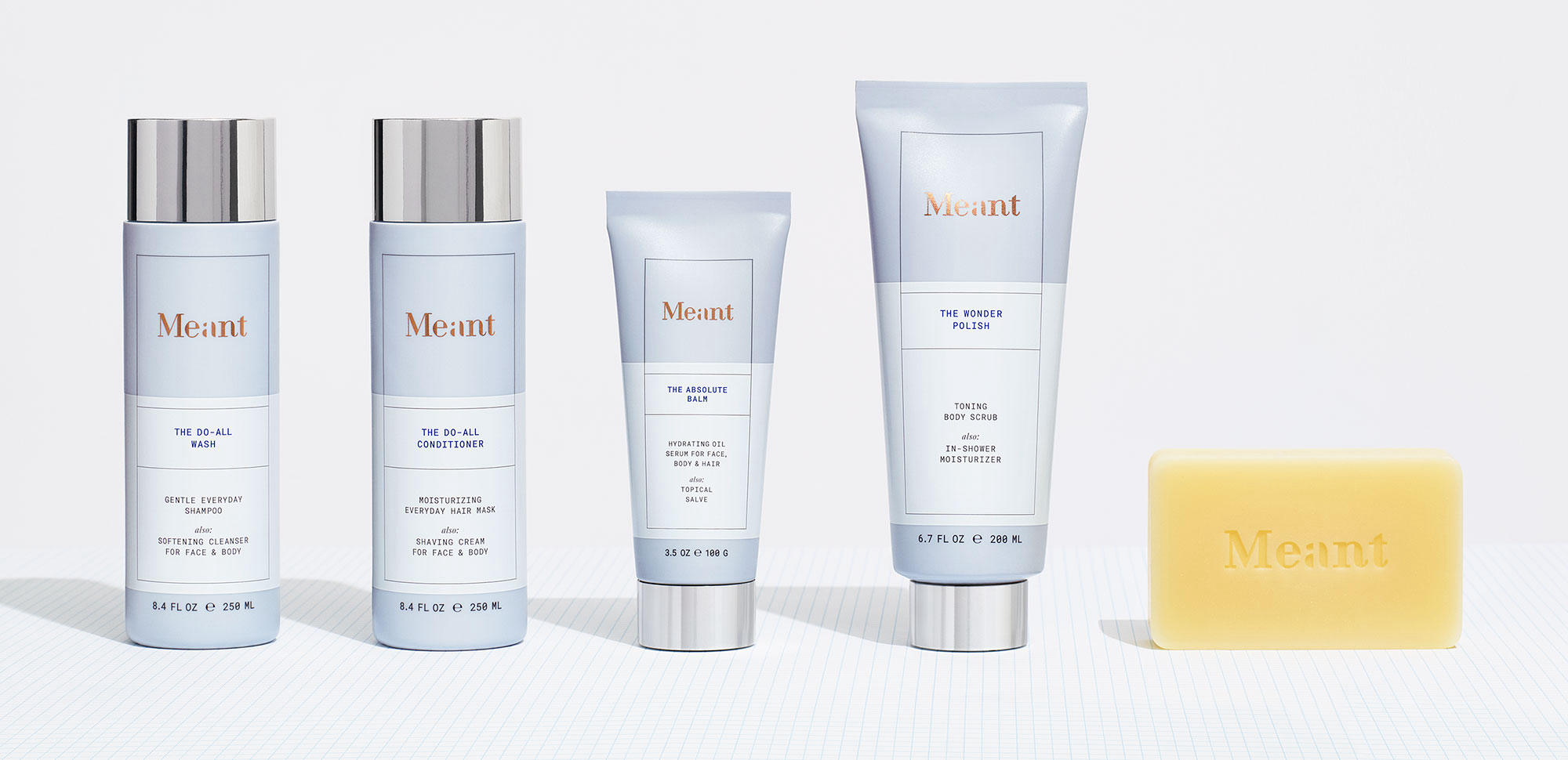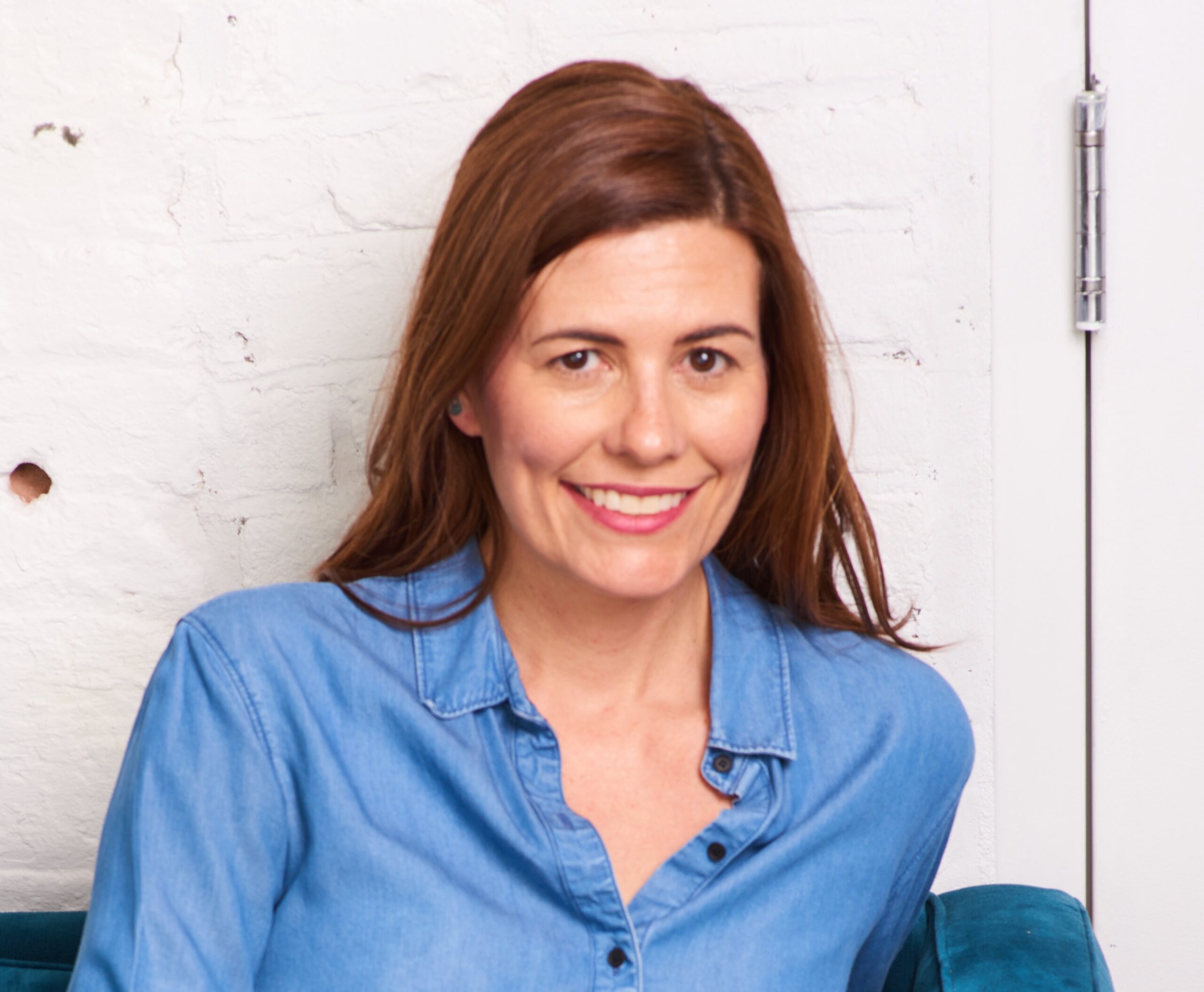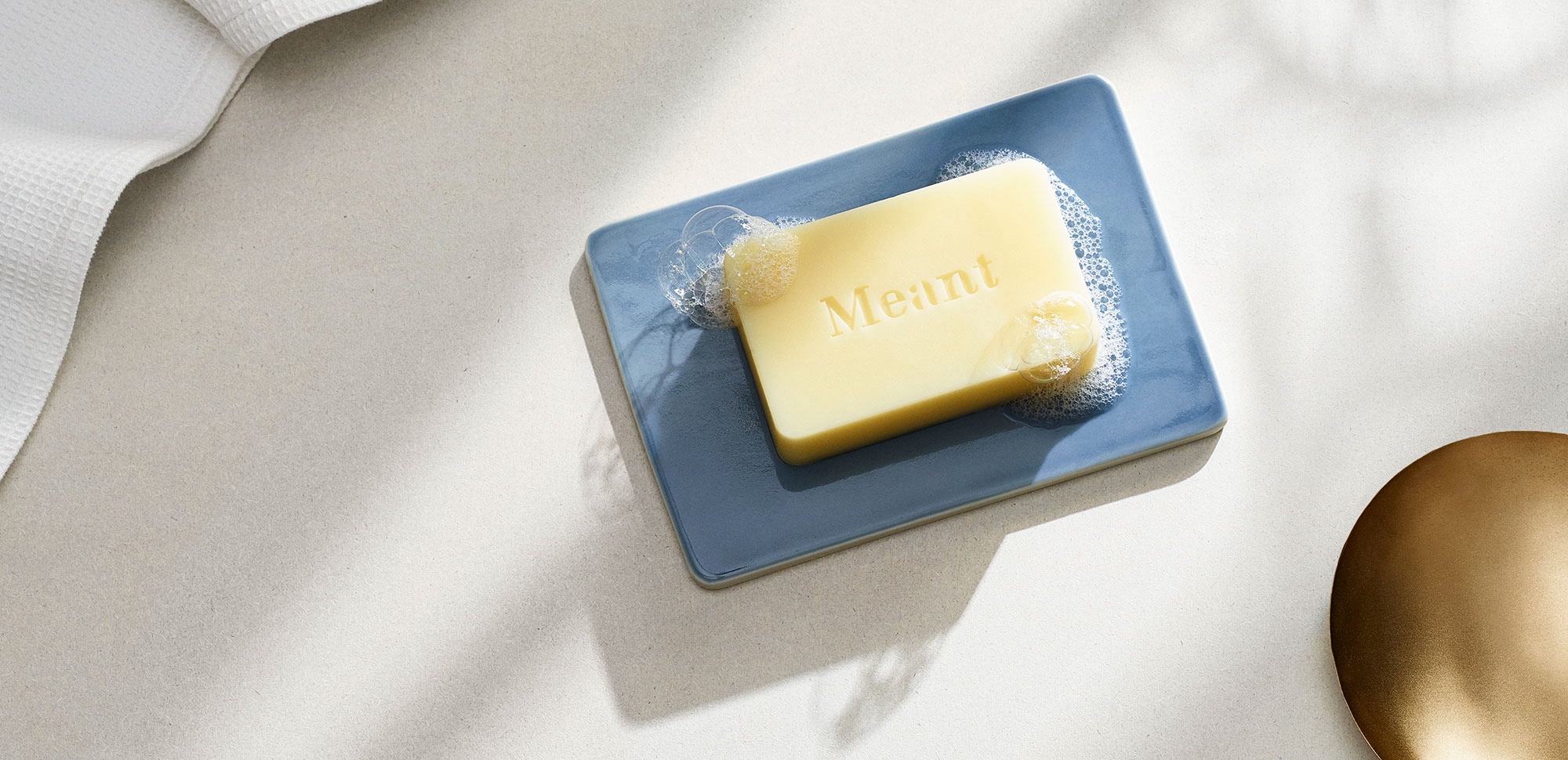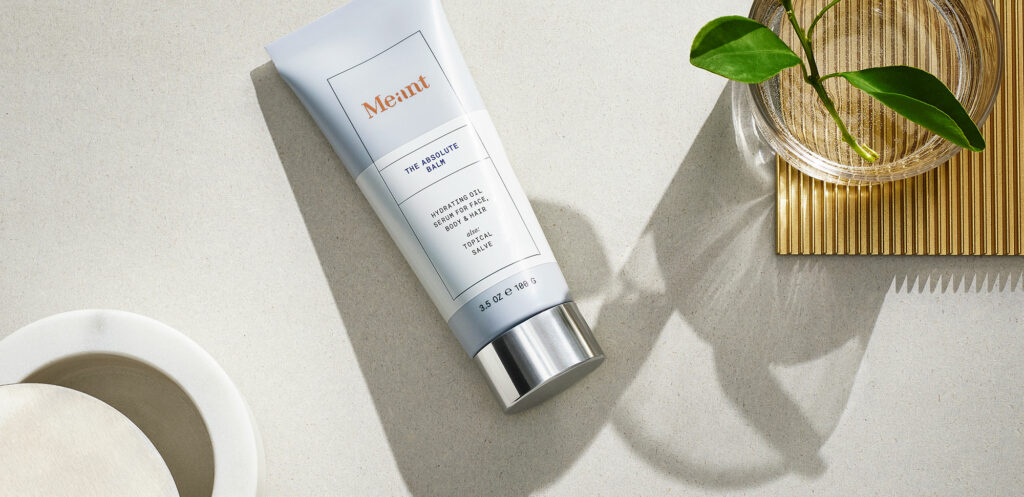
Founder Lindsay Knaak-Stuart On Why She Said Goodbye To Body Care Brand Meant
Seven years ago, Lindsay Knaak-Stuart spotted a white space that others would later conclude could generate plenty of green. “In 2015, no one was really talking about body care,” she remembers. “It was still Dove body wash and bar soap, and it was a very commodity-driven. I thought, ‘Let’s take a skincare approach to body.’”
Knaak-Stuart, formerly senior director of global brand marketing strategy at Kate Spade and director of marketing at Ann Taylor, went on to take that approach with Meant, a premium body care brand launched in 2017 with five multitasking products priced from $20 to $45: The Every Body Bar, The Wonder Polish, The Do-All Wash, The Do-All Conditioner and The Absolute Balm.
“People were feeling overwhelmed and were gravitating toward minimalism as a concept and living with less that does more. I myself was a minimalist, so I thought I could apply that concept to body care,” she says. “That’s where the hook of multitasking came in and the birth of five products that could do the work of 12 or more. It was also an environmental play. Let’s go down to five products and do everything with those five.”
Looking back at the outset of self-funded Meant, Knaak-Stuart admits to being a bit naïve about what’s required to orchestrate a brand from scratch that could be acquired someday. “If I wasn’t naïve, I probably would never have done this. I went in confident, not cocky confident, but confident that I had worked for 20 years and had experience I could use to launch a brand,” she says. “I didn’t think I was going to be the next Glossier because I didn’t have the resources to be the next Glossier, but I thought I had the opportunity to shake up the body category.”

Knaak-Stuart wasn’t off base about the resonance of body care, minimalism and multitasking products, but miscalculated on the pace of the maturation of body care beyond a commodity business, the power (or lack thereof) of free marketing, the extent of material costs and the money needed to compete in a packed beauty industry.
Convinced that pushing Meant to the next level would entail an expensive pivot to the mass market and hesitant to dip further into her personal savings to finance the pivot (Knaak-Stuart never drew a salary from the brand), she decided to close Meant and shared her decision via its social media accounts in July. The brand isn’t alone in shutting its doors. Save Me From, Lilah B., Sigil, Biophile, Makeup Geek and La Bella Figura are among the brands that have recently closed or revealed they will be closing.
“No regrets here at all. I’m super proud of what I have done and built,” says Knaak-Stuart. “There are I lot of things I would have done differently, but there are tons of things I wouldn’t have changed either. I feel like I’m going out on a high note.” Beauty Independent caught up with her to discuss the things she got right and wrong with Meant to understand its fate and the formidable hurdles indie beauty brands must overcome to make it today.
What Meant Got Wrong
Digital advertising and social media
Meant began teasing its launch on social media a month prior to it hitting the market. Knaak-Stuart believes it should’ve begun accumulating a social media audience far earlier. She points out clean makeup brand Minori began growing a social media presence two years in advance of its launch and supposes Meant should’ve adopted a similar tactic.
It took about $200,000 to develop Meant, half of which paid for inventory and half of which paid for packaging, branding, photography, website construction and public relations. “I had a custom made color for my bottles. I had a cap come in from the U.K.,” says Knaak-Stuart. “I spared no expense with the packaging and that played into the higher end of body care. I needed to deliver product that felt luxurious.”
By the time the brand was finished, there was little room left in the budget for digital advertising. “I wasn’t spending anywhere close to what anyone is spending on Facebook ads and Google,” says Knaak-Stuart. If she had a do-over, she would’ve perhaps hired a packaging expert to find packaging efficiencies and carve out a dedicated budget for digital advertising to be able to compete at least somewhat in the paid ad game.
“When I started my career, you had to do TV and radio ads, and I thought, ‘My god, we are living in an era where you can launch a brand without having to buy TV,’” says Knaak-Stuart. “I was leaning into the free part of marketing and media.”
Merchandise
Reflecting on Meant’s five-product debut collection, Knaak-Stuart postulates it might’ve been better to launch the brand with a single hero product. “Absolute Balm is my No. 1 seller by leaps and bounds,” she says. “Had I started smaller with a hero product I wouldn’t have had to buy into five different packaging concepts and five different ingredient lists. I could have saved some money there.”
Kicking off with a smaller assortment would’ve helped Meant to bring new merchandise to the market without undermining its minimalism positioning. “People crave newness,” says Knaak-Stuart. “I came out with all the newness to start, and there was no newness left.”

Distribution
Knaak-Stuart’s original intention was to keep Meant in direct-to-consumer distribution for as long as possible. She now deems that a misstep. “I would have pursued wholesale sooner for the pure sake of brand awareness,” says Knaak-Stuart. “I needed wholesalers to build my brand awareness in the absence of a huge digital budget.”
Six months into Meant’s business, she put retail on its roadmap, and the brand entered several retailers. It was at Urban Outfitters, Anthropologie, a Nordstrom pop-up and independent boutiques, for example. Despite Knaak-Stuart’s speculation that it would’ve been wiser for Meant to break into retail sooner, Meant’s experience at stores underscores retail isn’t an easy win for indie brands.
“I had a good run with some wholesalers, but wholesale is so finicky,” says Knaak-Stuart. “You are in Urban Outfitters for six months, and they say we want newness, so thanks, but no thanks. It was never a revenue stream that was predictable, but I would have gone bigger earlier in it if I could’ve.”
Body care
Knaak-Stuart wasn’t incorrect about the rise of body care—and a number of brands that followed Meant such as Nécessaire, Nakery Beauty, Kate McLeod and Gente are attempting to elevate body care. However, Knaak-Stuart determines it’s tricky to be a body care specialist.
“What you are seeing now is people who did skincare or something else coming out with body care like Kosas has a body wash,” she says. “They built a base of customers they are already talking to, and they rolled out into body because they see an opportunity in the body space.”
Body care hasn’t annihilated its reputation as a commodity, according to Knaak-Stuart. “That’s where I was struggling. People were just having a hard time rationalizing the price when they had been so used to getting a jug of body wash for $6,” she says. “I think my biggest opportunity was if I could’ve gone to Target and done the Method approach with something different, well-branded and cool, but at the Target price point.”
Brand Co-Founder
Knaak-Stuart would’ve loved to have had a co-founder with a complementary set of skills to hers. She envisions a creative type of co-founder who could’ve designed Meant’s website, emails and digital ads.
“It was really lonely as a solo entrepreneur. I was in my head a lot,” says Knaak-Stuart. “It would have been amazing to have someone to bounce ideas off of, and if it was someone with a complementary skillset, I could have saved money in those areas.”
What Meant Got Right
The Name
“I’m really happy to this day about my brand name,” says Knaak-Stuart. “It was easy to remember. You could pronounce it. I spent money on legal in the beginning. I had an amazing lawyer that I consulted with on everything, and we trademarked the brand early. He reviewed my taglines and packaging. Surrounding yourself with good partners, be they manufacturers, third-party logistics, retailers or lawyers, is important.”
Self-Funding
The idea that investors could’ve possibly weighed in on how to create Meant doesn’t appeal to Knaak-Stuart. “I wouldn’t have changed doing things on my own,” she says. “There were a lot of benefits of doing things on my own terms, especially coming from a corporate background where I was marching to someone else’s drum. It was really nice to be able to experiment and do things on my own.”

Formula ownership
Meant worked with its manufacturer and lawyer to purchase ownership of all of its formulas. “It surprised me how many people don’t own their formulas. That was something I did right out of the gate,” says Knaak-Stuart. “If I was ever going to sell, I needed to own my formulas because, if I don’t, I’m just a marketing company, I’m not a product, I’m not a brand.”
Public relations
For Meant’s launch, Knaak-Stuart hired a freelance publicist on a project basis for a fee she estimates was under $10,000 and subsequently paid a monthly retainer for a PR agency until the brand’s budget didn’t allow for it. As a result of PR efforts, Meant garnered substantial press attention and racked up around 100 press hits at publications like Vogue, InStyle, Refinery29, Byrdie, Self, Glamour and Well+Good.
“I feel good about having gone big with PR in the beginning. People would tell me, ‘I’m seeing you everywhere.’ Ideally, I would have been able to continue PR, but I didn’t have enough money,” says Knaak-Stuart. “I’m a big believer in PR. The ROI is hard to quantify, and it didn’t necessarily translate to sales. It wasn’t as if all of a sudden I got a mention in Vogue, and there were all these sales, but it added to the allure that I was bigger than I was.”





Leave a Reply
You must be logged in to post a comment.